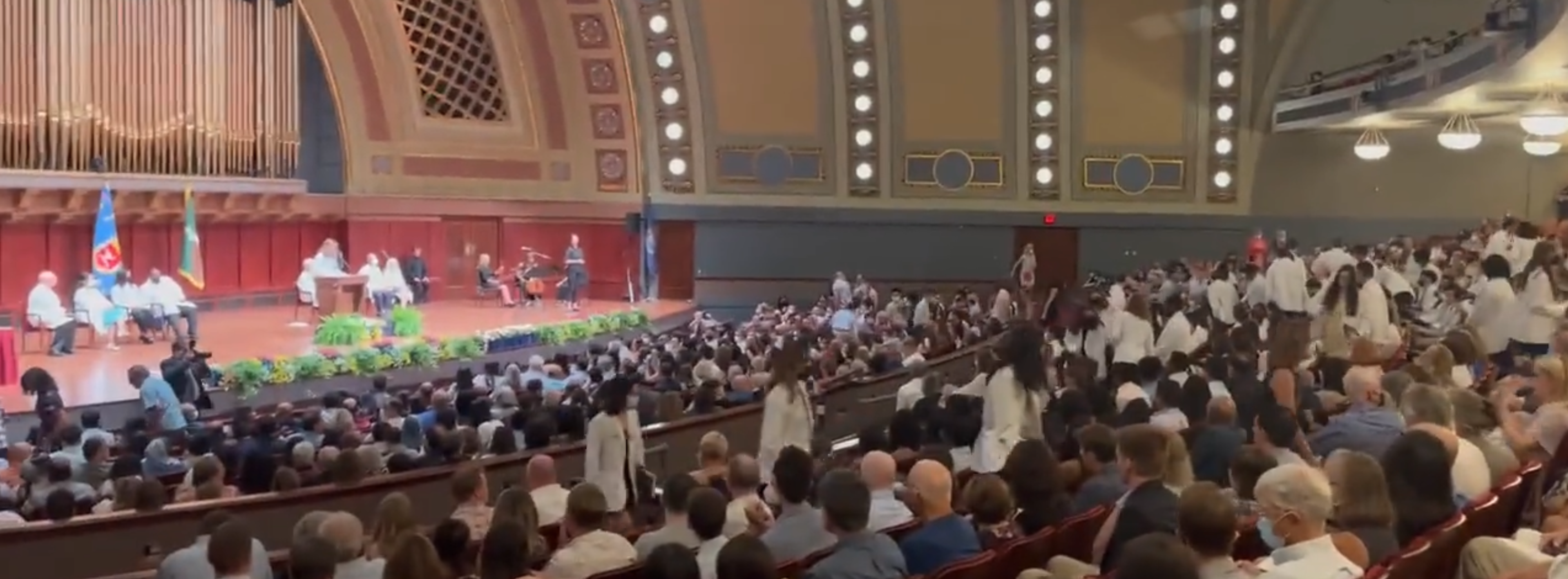
On Sunday, July 25, 2022, dozens of medical students and parents walked out of the University of Michigan white coat ceremony in protest when the keynote speaker, Dr. Kristin Collier, took the podium.
As an alumnus of the University of Michigan with pro-abortion views, I can’t help but reflect on the disturbing scene as we approach the time of year for the traditional white coat ceremony at medical schools.
It was a sad day in the annals of one of America’s preeminent medical schools. I wish the students had chosen to stay, despite their disagreement with the speaker’s views.
Anti-Abortion Views
After Dr. Collier was announced as the keynote speaker, a letter opposing the selection based on her antiabortion views was signed by hundreds of current and incoming students, as well as faculty and alumni.
I read in detail what led to her change from a pro-abortion advocate to becoming a born-again Christian, stridently anti-abortion. The speaker had become an antiabortion advocate but would not speak on that topic.
Keynote Selection
As instructed by the Dean of the medical school, members of the Gold Humanism Honor Society chose the suggested speaker. Members of the society are widely recognized by their peers for their compassionate patient care. Their choice of a young assistant professor suggests she struck a positive chord. The dean concurred with the selection and invited Dr. Collier to speak at the ceremony.
The first white coat ceremony as envisioned by Doctor Arnold Gold in 1993 at a Columbia ceremony, emphasized humanism in medicine. Over time, it has come to symbolize the welcoming of students into a storied highly respected profession.
I have been privileged to speak at similar ceremonies. It was an honor to be chosen, and I cherish the memories. The white coat ceremony and graduation ceremony are of such import that the keynote speakers should be held to a high standard. They should be sufficiently experienced to share their visions of medicine with students and their families. They should inspire attendees, not only with their words but their reputational stature.
Not a Thought-Provoking Demonstration
I believe in the necessity and power of peaceful thought-provoking demonstrations. Dissenting students should, in this setting, have rights and freedom of expression. Yet, they should also have had some understanding of their new professional responsibilities, not in isolation, but in the context of non-dissenting classmates and faculty in attendance.
I admittedly hold very strong pro-abortion beliefs. Having had a long career in medicine, I have always believed in the concept of “first, do no harm.”
Some might expect me then, to align myself with the students.
But I don’t.

Yet I can and do accept differences of opinion on this issue as long as both groups accept each other’s perspective. I fundamentally oppose for one group to try and prohibit another’s autonomy. Has politics entered medicine to such an extent that we abandon basic ethical principles? Students should respect their classmates’ decisions (autonomy and beneficence) and acknowledge differences of opinion (justice).
Can We Trust Future Doctors?
What does walking out say about the students who chose to leave? I worry they won’t treat all patients with respect.
Given the intellect, hard work, and perseverance it took for the dissenting students to gain acceptance into a top-tier institution they had a right to express their concern. They did such with their petition that received local press coverage before the event. I wish they had peacefully protested outside the auditorium on the ceremony day and not entered the venue at all. This would have expressed their displeasure while showing respect for their classmates and families who chose to participate in the special day. Protesting outside would have meant forgoing introducing themselves to those assembled and receiving their white coats. In my opinion, this would have been a significant sacrifice that did not make a spectacle of themselves and our profession.
I believe the students’ behavior was unprofessional, revealing a self-centered persona lacking consideration for their peers.
Sadly, the students who left missed reciting the Hippocratic Oath. Reciting it in this setting should be a memorable experience for those mature enough to understand the significance of joining the profession of medicine.
I worry that they would similarly choose to remain self-centric in the future, to the detriment of patients and the public. The oath (which they didn’t take) suggests they are bound to act uniformly in the best interest of their patients. What about the humanism that the day represented? What about the consideration that all people deserve the best competent care we can provide irrespective of status, politics, race, or religion – be they friend or foe?
My hope is that in the fullness of time, these students reconsider their decisions that day in light of knowledge acquired from interacting with patients, dedicated clinicians, and researchers. I hope they will ultimately show the promise, compassion, and giving of self that led to their acceptance into medical school.
Marshall Strome, MD, MS is a Professor of Bioethics and Humanism at the University of Arizona College of Medicine-Phoenix, an Adjunct Professor of Otolaryngology at Vanderbilt University and Professor and Chairman Emeritus at Cleveland Clinic Head and Neck Institute.